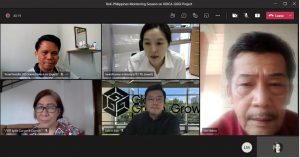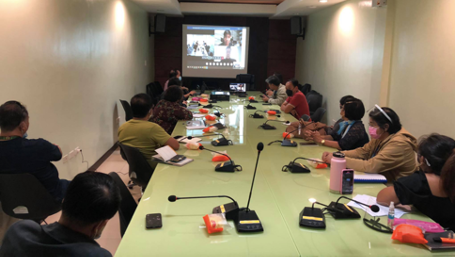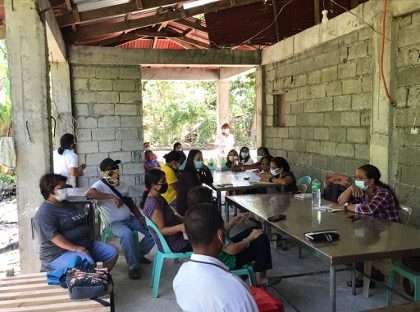In April 2021, GGGI participated in a series of preliminary monitoring and evaluation meetings with donor partners namely the Embassy of Republic of Korea in the Philippines and the Korea International Cooperation Agency (KOICA), on the project Climate Resilient and Inclusive Green Growth for Poor Rural Communities: Accelerating Implementation in the Agriculture Value Chain in Oriental Mindoro (hereafter “GGGI-KOICA Project”.
On April 20, 2021, GGGI and KOICA held a regular progress update meeting for Q1 2021, which served as an occasion where both parties reviewed the project implementation progress and discussed the upcoming plans. Both parties shared the need of proactive response to the COIVD-19 risk through hybrid working modality and practicing “one-team-approach” with government and non-governmental project stakeholders via the regular Project Management Unit (PMU) and the Provincial-level Technical Working Group (PTWG) meetings, which is currently being happened every month on average.
On April 29, 2021, GGGI also participated in the project monitoring session chaired by the Embassy of the Republic of Korea in the Philippines, which was conducted to monitor the progress of the Korea’s Official Development Aid (ODA) with the recipient government organizations in the Philippines: the Department of Trade and Industry (DTI) and Provincial Government of Oriental Mindoro (PGOM). On this occasion, GGGI-KOICA project was acknowledged by the Philippines government partners as it is aligned with the government agenda on strengthening climate adaptation capacities of rural communities, improving the income and productivity of micro-small and medium enterprises, and supporting poverty alleviation.
The major activities of the GGGI-KOICA project until the mid this year are to assess the project baseline, organize several layers of partnerships with governmental and non-governmental stakeholders, prepare modules for capacity development, and conduct several feasibility studies that will support effective investment to be provided for agri cooperatives and farmers in Oriental Mindoro.
All project stakeholders shared the common objectives of effective on monitoring and evaluation (M&E), so that the project creates tangible outcomes (e.g. jobs) for the people in need during this pandemic.
[Note: About the GGGI-KOICA Project]
With a grant funding of US$4.8million from KOICA and co-financing of US$ 260,000 from GGGI, the four-year program will be implemented until 2024 to achieve the following targeted activities aligned with the developmental aspirations of the Province of Oriental Mindoro, Philippines.
- Digitize climate risk, vulnerability and socio-economic information in Oriental Mindoro, which will enable evidence-based policies enhancing climate resilience and productivity of the agriculture value chain;
- Ensure quality operation of selected agri-cooperatives composed of smallholder farmers (producing calamansi, coconut, banana, and seaweeds) to link up with formal markets, by providing “catalytic” Property, Plant, and Equipment (PP&E) investment in and technical assistance; and,
- Establish a new Provincial Agriculture Center (PAC), which will catalyze agriculture value chain innovation and nurture locally grown farmer entrepreneurs, which will make local economy more vibrant.

Monitoring session chaired by the Embassy of the Republic of Korea in the Philippines was conducted on 29 April 2021 (From upper left clockwise: Arnel E. Hutalla, Director of DTI Oriental Mindoro; Seah Park (chair), Minister Counsellor of the Embassy of the Republic of Korea in the Philippines; Joel B. Valera, Regional Director DTI MIMAROPA Region; Juhern Kim, Country Representative of GGGI; Lydia R. Guevarra, Director of DTI Resources and Management Service.)

The GGGI-KOICA project has been adopting COVID-19 special working modality rapidly highlighting the one team approach, among governments, donors, and project-related stakeholders.

Agriculture cooperatives were consulted during the Q1 2021 to establish the baseline of the beneficiaries – this photo is about the meeting with SAMAHANG MANGGAGAWA SA BALATASAN (SAMASABALATASAN), one of the beneficiaries cooperatives producing seaweeds related products.